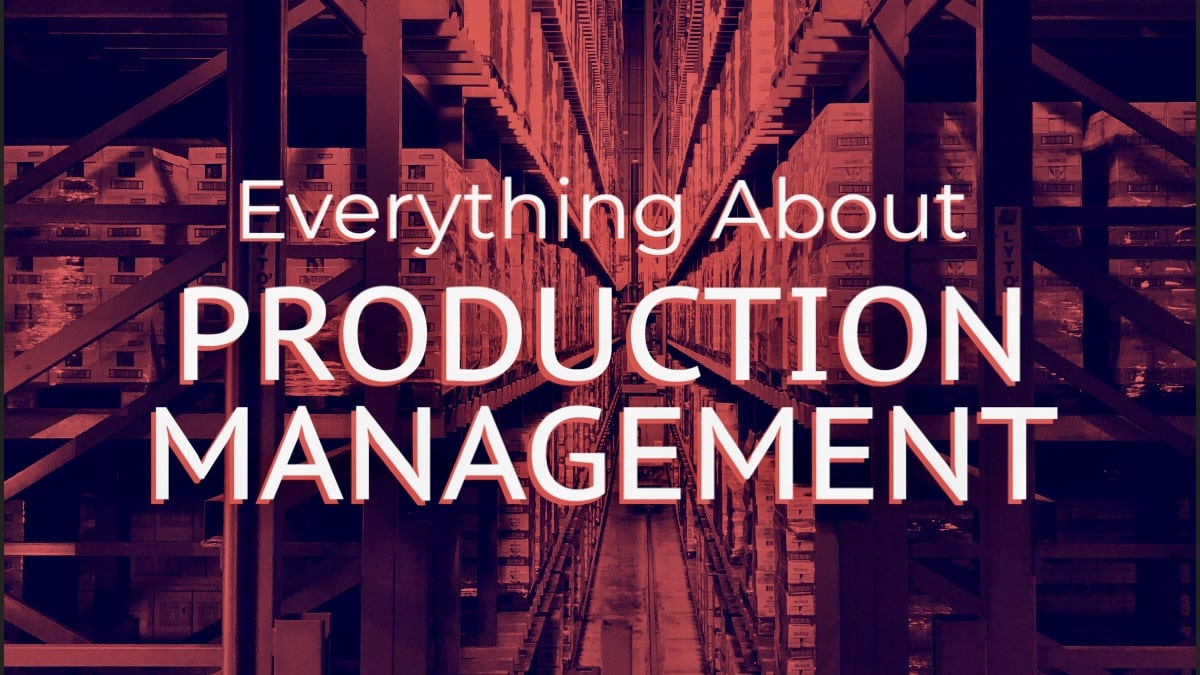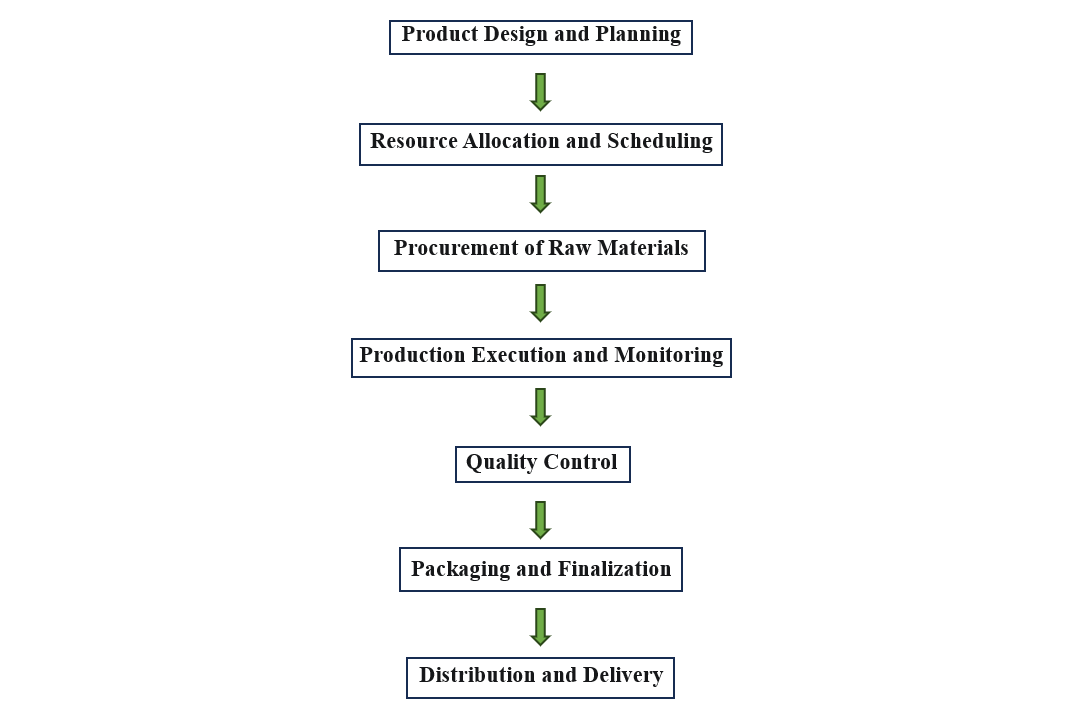
What is Production Management | The Ultimate Guide
Sep 24, 2024 5 Min Read 4907 Views
(Last Updated)
In today’s constantly evolving business landscape, production managers are essential to the success of any organization. Their skills in optimizing production processes, resource utilization, and maintaining high quality ensure that goods and services are delivered seamlessly.
If you’re seeking a career that combines strategic thinking, operational excellence, and the ability to make a real difference, production management might be the ideal path for you. This blog post provides a comprehensive overview of production management as a career option.
We’ll explore the significance of production management in business, its core functions and objectives, and the essential skills required to excel in this dynamic field. By the end of this article, you’ll have a thorough understanding of everything involved in production management, its applications across industries, and the exciting opportunities it offers for aspiring professionals like you.
Table of contents
- What is production management?
- What are the objectives of production management?
- Choosing the design and product
- Production controlling and management
- Machine maintenance and replacement
- Why is production management important?
- Enhanced efficiency
- Cost reduction
- Quality assurance
- What does a production manager do?
- Developing a production schedule
- Budgeting and cost management
- Quality control and productivity monitoring
- Coordination and communication
- Implementation of company policies and goals
- Reporting and performance management
- What is the scope of production management?
- Does technology play a role in production management?
- What are the industries that rely on production management?
- What are the skills required for effective product management?
- Career as a production manager
- Education & certifications needed for production management
- Conclusion
- Frequently asked questions
- What is the difference between a Product Manager and a Production Manager?
- What are some of the job titles that come under Production Management?
- What skills are required for a Production Manager?
- What are the risks involved with inefficient Production Management?
- What is the difference between Production Management and Operations Management?
What is production management?
Production management is a crucial career option that involves planning, organizing, and controlling the processes that transform inputs into finished goods or services. It is the coordination of resources, technologies, and personnel to achieve optimal production outcomes.
The production management department is responsible for overseeing the entire production process, ensuring smooth operations, and maximizing productivity. Unlike other business departments, production management specifically focuses on the physical creation and delivery of products or services. If you are interested in a career that involves managing and optimizing production processes, then production management is a great option to consider.
Here is a flowchart that illustrates the process of production management:

As you can see, production management involves a series of steps that begin with planning and end with the delivery of finished goods or services. Each step requires careful coordination and management to ensure that the production process runs smoothly and efficiently.
As we proceed to the next phase, upskill yourself to become a professional Product Manager and ace interviews with GUVI’s Certified Product Management Interview Preparation course that will help you bag the management role of your dreams.
What are the objectives of production management?
To better understand production management, it is essential to delve into its primary objectives and functions, which include paying attention to the design and product, optimizing production processes and ensuring smooth functioning of equipment & machinery. These can be further summarized as follows:
Choosing the design and product
Production management plays a vital role in determining the design and features of a product. It involves collaborating with various stakeholders, including marketing, design, and engineering teams, to develop products that align with customer needs and market trends. Having the appropriate skill set for product thinking is, thus, the first step toward effective production management.
Production controlling and management
The core function of production management is to establish and maintain effective control over the production process. This involves scheduling, resource allocation, monitoring quality, and ensuring timely delivery. By implementing efficient control mechanisms, production managers can optimize resource utilization and minimize production bottlenecks.
Machine maintenance and replacement
Another critical function of production management is to ensure the proper maintenance and functioning of machinery and equipment. Regular inspections, preventive maintenance, and timely replacement of outdated or faulty equipment are essential to avoid disruptions and maintain high production efficiency.
Why is production management important?
Production management holds great significance for businesses due to the following reasons:
Enhanced efficiency
Efficient production management leads to streamlined operations, reduced waste, and improved productivity. By implementing effective production techniques and optimizing resource allocation, organizations can achieve higher output levels with the same or fewer resources.
Cost reduction
Through careful planning, production managers can identify cost-saving opportunities, negotiate favorable supplier contracts, and implement lean production practices. These efforts help in minimizing expenses and maximize profitability.
Quality assurance
Production management plays a crucial role in maintaining product quality. By establishing quality control measures and adhering to industry standards, organizations can deliver products that meet customer expectations, leading to enhanced customer satisfaction and brand reputation.
What does a production manager do?
As a Production Manager, your responsibilities extend far beyond overseeing the production process. You play a crucial role in ensuring timely delivery, aligning production with market demand, and meeting customer expectations. Let’s explore the diverse range of tasks that fall under your purview:
Developing a production schedule
One of your primary tasks is to create a comprehensive production schedule. This involves determining the required resources and placing orders to procure them. By effectively planning and organizing the production timeline, you lay the foundation for a smooth and efficient process.
Budgeting and cost management
You collaborate with clients and line managers to estimate and agree upon project budgets. You continuously monitor production, making necessary adjustments to schedules as needed to ensure that production remains cost-effective and maximizes profitability for the organization.
Quality control and productivity monitoring
Maintaining high product quality is a top priority for you. You establish and implement quality control programs, monitoring productivity levels to identify potential areas of improvement. In addition, you take charge of equipment maintenance, swiftly repairing any damage to minimize disruptions and maximize production efficiency.
Coordination and communication
You serve as the central point of contact between various departments, teams, and external stakeholders such as suppliers and clients. You facilitate effective communication, ensuring that all relevant parties are informed and aligned. Additionally, you prioritize adherence to health and safety guidelines, creating a secure working environment for the entire production team.
Implementation of company policies and goals
Working closely with managers, you play a pivotal role in translating the company’s policies and goals into actionable plans. You collect and analyze data to make informed decisions, ensuring that customers’ orders are completed within the specified timelines and budgets.
Reporting and performance management
You compile and present comprehensive production reports to factory managers and customers, providing valuable insights into the production process. You supervise and motivate a team of workers, reviewing their performance and identifying training needs to enhance productivity and efficiency.
In essence, your role as a Production Manager involves a wide range of responsibilities that span production planning, resource management, budgeting, quality control, communication, and performance management. By effectively fulfilling these duties, you contribute significantly to the overall success and profitability of the organization.
What is the scope of production management?
Production management is an exciting field that offers numerous career opportunities across various industries. As a professional in this field, you can progress to leadership and managerial roles, where you’ll be responsible for making strategic decisions and overseeing teams. To succeed in this field, continuous learning and skill development are crucial, with a focus on areas such as lean manufacturing and supply chain management.
Having production management expertise can also open opportunities for entrepreneurship or consulting, where you can leverage your knowledge to improve operations and create value. Additionally, there are global opportunities available, as organizations require professionals who can navigate global supply chains and manage cross-cultural teams.
With the demand for skilled production managers remaining steady, there is ample opportunity for growth and success in this field. Read our comprehensive guide on India’s top emerging career options and the future job market.
Does technology play a role in production management?
Technology plays a crucial role in production management. Automated processes and digital tools have made it easier for organizations to plan, execute, and control their production processes. With advanced technologies such as the Internet of Things (IoT), AI, and robotics, real-time monitoring, predictive maintenance, and improved decision-making have become possible. It’s amazing to see how technology has made production management more efficient and effective.
What are the industries that rely on production management?
Production management plays a vital role in many industries, ranging from manufacturing to healthcare. Thanks to technology, this field has undergone a significant transformation, resulting in increased efficiency.
Automated processes and digital tools have made it possible for organizations to plan, execute, and control their production processes with ease.
This has had a significant positive impact on industries such as automotive, electronics, consumer goods, healthcare, hospitality, and logistics, enabling them to meet market demands and ensure seamless service delivery.
What are the skills required for effective product management?
To excel in production management, you need a combination of workplace and technical skills. The following table presents a clear overview of the essential workplace and technical skills you need:
| Workplace Skills | Technical Skills |
| Strong leadership and communication abilities | Knowledge of production planning and scheduling techniques |
| Excellent problem-solving and decision-making skills | Understanding of quality control and lean production principles |
| Effective time management and organizational skills | Familiarity with supply chain management concepts |
| Ability to work under pressure and meet deadlines | Proficiency in data analysis and utilization of production management software |
| Teamwork and collaboration skills for cross-functional coordination | Awareness of health and safety regulations and compliance standards |
Career as a production manager
A career in production management is a promising avenue for growth and advancement. The demand for streamlined production processes is on the rise, and skilled production managers are highly sought after.
Based on industry and experience levels, statistics indicate that the median salary for production managers in India ranges from INR 8 lakhs to INR 20 lakhs per year. These salary ranges demonstrate the rewarding nature of this career and highlight the potential for competitive earnings in the Indian market.
Education & certifications needed for production management
When it comes to production management, there isn’t a one-size-fits-all educational path. However, a bachelor’s degree is typically the minimum requirement. Many Production Managers hold a degree in a related field such as industrial engineering or business management. Other courses that can help aspiring Production Managers include pursuing a Diploma or MBA in Supply Chain Management Courses. These educational opportunities can provide valuable knowledge and skills necessary to succeed in the field of production management.
Kickstart your Product Management career with GUVI’s Certified Product Management Interview Preparation course that will help you bag the management role of your dreams.
Conclusion
Understanding the goals, functions, and applications of production management is key to achieving organizational success. Staying up to date with technological advancements and obtaining the necessary skills are crucial for becoming an effective production manager in today’s competitive business world.
Pursuing a career in production management can be highly rewarding and offer great potential for personal and professional growth. We wish you the best as you embark on this exciting career path.
Frequently asked questions
A Product Manager is primarily focused on the promotion, marketing, profitability, and sales of a product. At the same time, a Production Manager is responsible for overseeing the development and production processes to transform raw materials into the finished product.
It’s important to understand the unique roles and responsibilities of each position, as both are essential in ensuring high-quality products are delivered successfully.
Some roles that come under Production Management include Production Manager, Manufacturing manager, Assistant Production Manager, Industrial Production Manager and Plant Manager.
Desired skills for a production manager include:
– Team and relationship building
– Effective communication
– Thrives under pressure and multitasks
– Positive and creative mindset
– Collaborative team player
– Strong leadership abilities
– Exceptional organizational skills
– Proficient in manufacturing standards
– Strong interpersonal skills
– Skilled in project management
Inefficient Production management can lead to higher costs, surplus items, delays in output, lesser profits, and wastage of time & resources.
Regarding the difference between production and operations management, it’s all about efficiency. Production management is about transforming resources into a valuable product as efficiently as possible. On the other hand, operations management is all about minimizing waste and optimizing processes to make the most of available resources. The focus is always on making things run as smoothly as possible.























Did you enjoy this article?